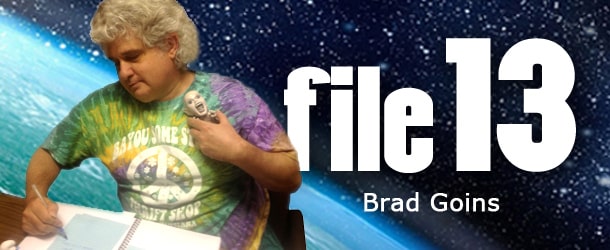Let’s begin our brief visit to the world of nonsense dialogues by considering a dialogue that’s absurd but not at all nonsensical. The dialogue comes from the famous scene in the Monty Python movie Life Of Brian when Brian finally has a chance to address his followers and try to convince them he’s not the messiah:
Brian: I’ve got one or two things to say.
The Crowd: Tell us. Tell us both of them.
Brian: Look, you’ve got it all wrong. You don’t need to follow me. You don’t need to follow anybody! You’ve got to think for yourselves. You’re all individuals!
Crowd: Yes, we’re all individuals!
Brian: You’re all different!
Crowd: Yes, we’re all different!
Single follower: I’m not.
Brian: You’ve all got to work it out for yourselves!
Crowd: Yes! We’ve got to work it out for ourselves!
Brian: Exactly!
Crowd: Tell us more!
Brian: No! That’s the point! Don’t let anyone tell you what to do!
Monty Python was certainly not satirizing the times of Jesus as much as our time, when the cult of individuality is pervasive. The joke, of course, is that masses of people use identical, conformist phrases to assert their individuality. The conformity of language about individuality, along with the failure to understand what the language means, reminds the viewer of the absurdity of a world in which individuality is universally proclaimed; is accepted as a given; and is rarely experienced.
So, the situation is absurd. But does the language make sense? It does. When Brian says, “You’ve all got to work it out for yourselves,” we may agree, disagree or be indifferent, but we all know what he means.
Now let’s enjoy a couple of absurd dialogues that add just a little nonsense language to the mix. We’ll draw from the movie In The Loop, the wickedly witty BBC satire of the invasion of Iraq by the “Coalition of the Willing.”
In the film, the timid British Minister for Internal Development, Simon Foster, has said on a TV program that “war is unforeseeable.” The furious British Communications Director Malcolm Tucker confronts Foster, whom he confuses of failing to follow the government line.
Simon: Are you saying I’m now no longer allowed to make media appearances?
Malcolm: Correct. Not until we can trust you to keep the line.
Simon: I was going to keep to the line. I was going to say, “I don’t think war is unforeseeable …”
Malcolm: What is it, then?
Simon: I dunno. Foreseeable?
Malcolm: No. No! Not foreseeable. That’s [dirty word] declaring war. Do you want to [dirty word] declare war?
Simon: I’m a Cabinet minister. I didn’t get here by screwing up every media appearance I ever had.
Malcolm: Write this down. It’s neither foreseeable nor unforeseeable.
Simon: Right, so not inevitable, but not…
Malcolm: You’d better walk on this [dirty word] line.
Simon: … evitable.
The government’s official line is that it neither supports nor opposes the war. (In fact, the government supports the war but won’t say so.) Simon isn’t quite bright enough to wrap his head around the notion that neither opposing nor supporting can be a government line. In his efforts to comprehend the situation, he ventures into the land of nonsense language as he generates the word “evitable.” His confusion is expressed as nonsense.
Simon opposes the war but doesn’t have the backbone to come out and say so. So he uses the absurd strategy of expressing support for the war in some circles and opposition in others. This has half of Washington thinking he’s a war hawk and half thinking he’ll resign if there’s an invasion.
Simon again veers into nonsense language as he struggles to grasp such an absurd situation (and this time an absurd situation of his own making). Here he makes a futile effort to explain his non-position to two opponents of the war.
U.S. Lt. Gen. George Miller: So you’re not resigning [if there’s an invasion]?
U.S. Asst. Secretary of State Clarke: Are you still playing the hawk?
Foster: Well, in a way I’m playing a much cleverer game than that … I’m a fake hawk.
Miller: [pause] A what?
Foster: … Fake hawk?
Miller: [pause] You’re an idiot. Or are you a … fake idiot?
At first Miller is taken aback by the nonsense phrase “fake hawk.” But he recovers quickly and delivers a withering mockery of Foster’s gibberish with the phrase “fake idiot.”
Now let’s go for a movie dialogue that’s mainly nonsense. It’s from the comedy Stepbrothers. The two protagonists have showed up at the same time for an interview for a single job opening.
Will Ferrell: And, human resources lady…
Interviewer: Actually, it’s Pam.
Ferrell: I’m sorry. Well, Pan…
Interviewer: No, my name is Pam.
Ferrell: Are you saying Pan or Pam?
Interviewer: I’m saying Pam.
John C. Riley (coming out of hiding): Hello, Ms. Lady. I’m Dale. I’m Brennan’s stepbrother, and I think I might be able to help with the Pan-Pam dilemma.
Ferrell: Yeah, that’d be great.
Interviewer: Pam.
Ferrell: Pan.
Interviewer: Pam.
Ferrell: Pand. There’s a D on the end.
Riley: With an M.
Interviewer: There’s no D. It’s Pam.
Riley: It’s like “comb,” except P-A-N-M.
Ferrell: N-N. There’s two Ns.
Riley: Two Ms. That was the confusion.
Interviewer: No, there’s just one M.
There is at least a sensible explanation for this nonsense. We can easily see that the Ferrell and Riley characters are trying to annoy the interviewer. They both know perfectly well her name is Pam; there’s no “Pan-Pam dilemma.” As ridiculous as the situation is, it’s actually less absurd than the first three we looked at.
But notice that the fact that there’s a sensible (if stupid) explanation for the language doesn’t keep the language from being nonsense. Nor does the fact that the language is more or less standard English keep it from being nonsense.
Next is a monologue that is, if possible, even more nonsensical than the words of the stepbrothers. The monologue comes from the “The Duel” episode of the fifth season of the TV show The Office. David Wallace has invited the inept boss Michael Scott (played by Steve Carell) to the company’s central office to explain how it is that sales have gone up in Scott’s office. Scott, glowing from a surge of intense vanity, spews out this beautiful stream of pristine gibberish:
David, here it is. My philosophy is basically this: and this is something that I live by, and I always have, and I always will. Don’t ever, for any reason, do anything, to anyone, for any reason, ever, no matter what, no matter where, or who, or who you are with, or where you are going, or where you’ve been. Ever. For any reason. Whatsoever. Sometimes I’ll start a sentence, and I don’t even know where it’s going. I just hope I find it along the way. Like an improv conversation. An improversation.
Some might try to find a germ of sense in that nonsense. If we could reduce it to the statement “don’t ever do anything to anyone,” we would at least have a statement that made sense. On the other hand, that doesn’t seem like a statement that would have any relation to strong sales.
But notice that with the appearance of the words “or who,” we can no longer parse the sentence; that is, we can no longer put it in a diagram, as we did in elementary school. The sentence has become grammatically incoherent. With the words “or who,” the sentence veers off into the domain of absolute nonsense that’s no longer amenable to everyday analysis.
Scott’s ridiculous closing words, which hint that on some level he knows he’s making up nonsense language, and which close with the nonsense coinage “improversation,” are just humorous gravy for the babble. (I guess it should go without saying that the senselessness of Scott’s language is a tremendous disappointment for the boss.)
Let’s conclude with one of the best known nonsense dialogues. It comes from another Monty Python film: Monty Python and the Holy Grail. It’s the well-known scene in which the king gives two guards what should be a simple order: keep my son in his room until I come and tell you otherwise.
The King: Make sure the prince doesn’t leave this room until I come and get him.
(The king tries to leave the room.)
Guard 1: Not to leave the room even if you come and get him.
King: No, no. UNTIL I come and get him.
Guard 1: Until you come and get him, we’re not to enter the room.
King: No no. You stay in the room, and make sure HE doesn’t leave.
Guard 1: And you’ll come and get him. Right. We don’t need to do anything apart from just stop him entering the room.
King: No, no. Leaving the room.
Guard 1: Leaving the room, yes.
King: All right?
Guard 1: Right. Oh, if, uhh …
King: Look it’s quite simple. You just stay here, and make sure he doesn’t leave the room, all right?
Guard 1: Oh, I remember … Uhh, can he leave the room with us?
King: No. No, no! You just keep him in here and make sure …
Guard 1: Oh yes, we’ll keep him in here, obviously. But if he had to leave, and we went with him …
King: No, wait, just keep him in here.
Guard 1: Until you or anyone else …
King: No, not anyone else … just me.
Guard 1: Just you.
King: Get back.
Guard 1: Get back.
King: Right?
Guard 1: Right. We’ll stay here until you get back …
King: And, uh, make sure he doesn’t leave.
Guard 1: What?
King: Make sure he doesn’t leave.
Guard 1: The prince?
King: Yes, make sure he doesn’t leave.
Guard 1: Oh, yes of course. I thought you meant him! [Meaning, I thought you meant make sure the other guard doesn’t leave.] You know it seemed a bit daft me having to guard him when he’s a guard.
King: Is that clear?
Guard 1: Oh quite clear! No problems.
King: Right.
(All try to leave at once.)
King: Where are you going?
Guard 1: We’re coming with you.
King: No, no. I want you to stay here and make sure HE doesn’t leave!
Guard 1: Oh, I see, right.
The explanation the viewer is given for this language is that the guards are drunk. But I suspect this explanation is given solely to keep the plot moving and won’t begin to explain the idiocy in the dialogue. (The members of Python claimed the dialogue was improvised on the spot.) Is there a sort of drunkenness that would produce this kind of humorous language? Would we expect a dead drunk person to say such things as “oh, yes, we’ll keep him in here, obviously” and “Oh, quite clear!”
Are the guards trying to provoke the king? We wouldn’t expect medieval guards to engage in the suicidal behavior of intentionally provoking the king.
If the guards are, somehow, both simply morons, we are, again, at a loss to explain the complexity of Guard 1’s language. My guess is that in this case, the situation is as nonsensical as the dialogue that comes out of it.
Although I can’t be sure, my guess is that intentional nonsense largely defies analysis. That might be for the best.
But why pay attention to nonsense at all? One of the values of some nonsense language is that it can give us intensely pleasurable diversion.
There are other values. As much as I loathe the cliché “life lessons,” I see that good nonsense gives us a couple of them. It shows us that things don’t have to make sense and that what doesn’t make sense can be as beautiful as anything else. Both lessons are valuable tools in making the world comprehensible, manageable, bearable and enjoyable.















Comments are closed.